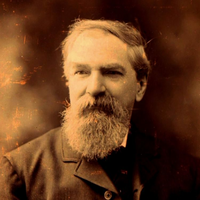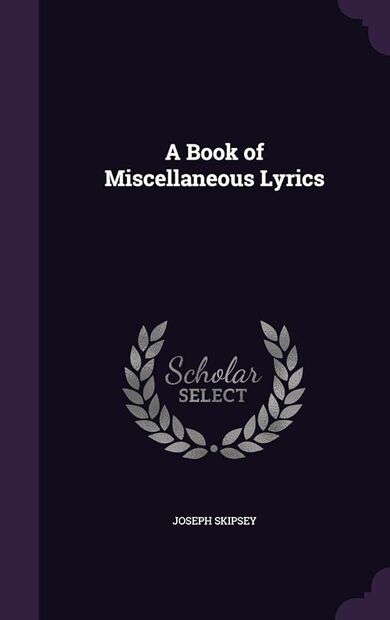Thistle and Nettle
’TWAS on a night, with sleet and snow
From out the north a tempest blew,
When Thistle to her cot did go
The little Nettle’s self to woo.
His errand known, she, with a frown,
Up from a sock a-knitting sprung;
Down took the broom and swept the room,
While like a bell her clapper rung.
“Have I not seen enough to be
Convinced for ever soon or late
The maid shall rue the moment she
Attendeth to a wooer’s prate?
”How long ago since Phemie Hay
To Harry at the Mill fell wrong?
How long since Hall a prank did play
Shall e’er be rued by Ellen Strong?
“How long ago since Adam Smith
Wooed Annie on the Moor, and left
The lassie with a stain? yea, with
A heart of every hope bereft?
”But what need instant cases? lo!
Have I not heard thee chaunt the lay
‘The fraud of men was ever so
Since summer first was leafy?’ eh?
“When men are to be trusted, then,
—But never may that time befall;
Of five times five-and-twenty men,
There’s barely five are men at all.
”Before the timmèd maid they’ll fall,
And smile and weep and sigh and sue;
Till once they get her in their thrall,
And then she’s doomed her lot, to rue.
For her a subtle snare they weave,
And when the bonny bird is theirs,
Then, then they giggle in their sleeve;
Then, then they laugh at all her fears.
“Another western wind, they woo
The bloom its treasures to unfold;
Extracts its wealth—their way pursue,
And leaves her pining on the wold.
”—When men are men, come woo me then—
Till then, lo I am on my guard,
And he the loon that brings me down,
He, he’ll be pardoned on my word!”
Thus for an hour her tongue was heard,
By this, her words grown faint and few;
She raised the broom at every word,
And thumped the floor to prove, it true.
In ardent words the youth replied:—
“Dread hollow-heart guile thou must,
But deem not all of honour void
Nor punish all with thy mistrust.
”A few, not all the lash have earn’d,
Let but that few be lashed. Nay, sure,
The world were topsy-turvy turned,
Did not some sense of right endure.
“Destroy the weed, but spare the flower;
Consume the chaff but keep the grain;
Nor harry one who’d die before
He’d give thy little finger pain.”
On hearing this, she sat her down,
Took up her needle-work again,
And tho’ she strove to wear a frown,
Made answer in a milder strain.
“Forego thy quest. Deceitful words
May be, as they have been, may be
A fatal lure to lighter birds,
They’ll never prove the like to me.
”Still by my chastity I vow
As I have kept the cheat at bay,
So, should I keep my senses, so
I’ll keep him till my dying day.
“The best that man can do or say,
The love of gold or rubies rare,
Not all that wealth can furnish, may
Once lure to leave me in a snare.
”So end thy quest." He only prest
His ardent suit the more, while she
At every word he uttered, garr’d
Her fleeing needles faster flee.
“My quest by honour’s justified;
I long have eyed and found thee still
The maid I’d like to be my bride;
Would I could say the maid that will.
”Hadst thou but been a daffodil
That with the breezes sport and play
For all thy suitor valued, still
Thou so hadst danced thy life away.
“But thou so fair art chaste.” Thus he
Unto her answer answers e’er,
And that too in a way that she
Must will or nill his answer hear.
And then a chair he’d ta’en, his chair
Unto her chair he nearer drew;
Recurr’d to memories sweet and rare,
And in a softer key did woo.
He spake of moments vanished, when
The happiest pair of all the young
They hand in hand a-down the glen
Together sported, danced and sung.
The linnet’s self the boughs among,
The lammie skipping o’er the way,
Sang not than they, a sweeter song,
Played not a merrier prank than they.
“Ah, these were golden times!” Thus goes
His descant till her brow grows sleek,
Till lo! the lily drives the rose.
The rose the lily from her cheek.
And now the iron sparking hot
Around with might and main he swings,
And down upon the proper spot
With bang on bang the hammer brings.
“Be, be my suit but undenied,
And ere the moon is on the wane
A knot shall by the priest be tied,
The priest shall never loose again.
”In heart and hand excelled by none,
Henceforth I’d front the ills of life,
And every victory I won
Should be a jewel for my wife.
“So should the people of the dell
When they convened to gossip say,
For harmony we bore the bell,
And bore it with a grace away.
”Nay, lift thy head, be not ashamed
If thus to feel—and thus—and, O!
As matters sinful might be blamed—
Then saints were sinners long ago.”
Here silence deep ensued. The cat
That lately to the nook had stept
To mark the sequel of their chat,
Came forth, lay on the hearth, and slept.
The needles that flew here and there,
And in their glee had sought to vie
A moon-beam dance upon the mere,
Neglected on her apron lie.
In concord with the storm within,
The storm without forbears to blow;
And 'tween the sailing clouds begin
The joyous stars to come and go.
O’er all delight prevails. Nor swayed
By doubt and dread she longer seems,
But on our hero’s bosom laid
The maid a dream of rapture dreams.
Dream on blest maid! An hour like this
Annuls an age of care and strife,
And turns into a drop of bliss
The bitter cup of human life.
The tear is by a halo gilt,
The thorns of life are changed to flowers;
The dirge into a merry lilt,
When love return’d for love is ours.
And so our heroine felt. In soft
Sweet tones, at length her accents flow—
“I’ve heard of honied tongues full oft,
But never felt their force till now.
”Still would I fume as day by day
I’ve seen our damsels bought and sold
By some I’d scorn’d to own, had they
Outweighed their very weight in gold.
“My hour of triumph’s o’er. In vain
Did I my fellow maids abuse,
I’ve snatched the cup and drank the bane
That sets me in their very shoes.
”That turns a heart of adamant
To pliant wax; and in my turn
Subjects me to the bitter taunt
The vanquish’d victor’s ever borne.
“That leaveth Nettle satisfied
To leave her kith and kin, and by
Her ever faithful Thistle’s side
To shelter till the day they die.”


